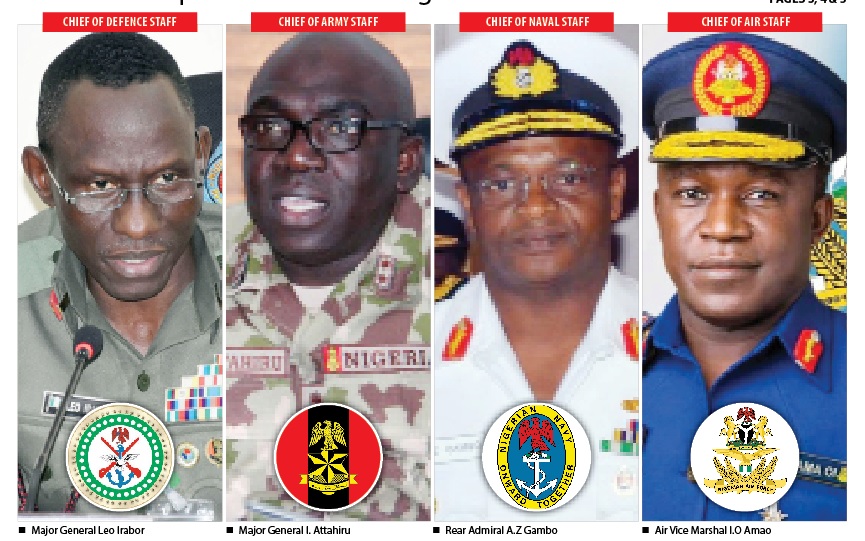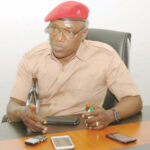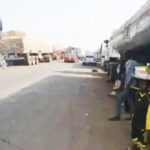The replacement of the service chiefs has been expected, hoped for, demanded even but President Buhari held on to his now former service chiefs for as long as he could, longer than was necessary, in a move one expert said has damaged the military’s succession structure. When he eventually decided to part ways with them, many Nigerians had given up on the president shaking things up.
But who are the men now trusted by President Buhari to deliver one of his fundamental campaign promises—tackling insecurity?
- AEDC alerts on power interruption in parts of Abuja
- Meet the new service chiefs: who are they, what have they done?
The Chief of Defence Staff
Maj. General LEO Irabor
This man is a known name in the military, mostly as the Theatre Commander of Operation Lafiya Dole tasked with reclaiming the country’s territory from Boko Haram. Lucky Irabor led his men to some major gains in the fight against insurgency in the Northeast. His leadership style has been commended as open as he regularly held press briefings to update the country on the progress of his troops. He has been described by people within and outside the force as a brave, courageous and upright person.
However, in 2017, the Agbor native from Delta State was posted to Field Commander, Multinational Joint Task to coordinate the regional effort to tackle insurgency.
Before his appointment as the Chief of Defence Staff, Gen. Irabor was the Chief of Training and Operations, Defence Headquarters, Abuja.
As the COTOPs, Irabor, a member of the Regular Course 34, oversaw training and operations in the Armed Forces and reported directly to his predecessor, the former CDS. His role included taking periodic reviews of a broad range of policies and activities relating to training and operations.
In addition to his schedules, he is the Chairman of the AFN Committee on COVID-19, which is working to prevent the spread of coronavirus in the Armed Forces. The Committee is also giving support to the Presidential Task Force on COVID-19, including in the deployment of medical personnel across the country.
Sadly, under his watch, in this position, about 20 military generals caught the virus during a conference with one senior general dying.
Regardless, Irabor is well thought of in the army. He has also had military training at the Ghana Armed Forces Staff College, the National Defence College Bangladesh and Executive Programme of the Harvard Kennedy School of Government in the US.
However, he first trained as an engineer at the Obafemi Awolowo University, Ife and holds two Master’s Degrees from the University of Ghana, Accra, and Bangladesh University of Professionals, Dhaka.
In his new role, technically, Irabor is at the head of Nigeria’s estimated 120, 000 man-strong military but it is hard to see how much influence he can wield as he has no direct control of troops or the other service chiefs who head the various units of the armed forces.
Chief of Army Staff
Maj. Gen. Ibrahim Attahiru is perhaps a controversial choice to head the Army. Incidentally, he succeeded Maj. Gen. Irabor as Theatre Commander, Operation Lafiya Dole in 2017.
His predecessor as COAS, Lt. Gen. Tukur Buratai had given him the directive to capture terror leader, Abubakar Shekau within 40 days between July 21 and August 30, 2017.
That objective was not met but Buratai commended Gen. Attahiru “for pursuing the COAS directive” and eliminating five key Boko Haram commanders, a 2017 military statement said.
His stint as theatre commander was however brief as he was replaced in December, after seven months in charge.
Barely a month after taking charge of the fight against Boko Haram, Maiduguri, where the 7 Div of the army is based, came under attack from the terror group. The military was said to have suffered setbacks with Attahiru in charge.
Before his appointment as COAS, Attahiru served as the GOC of the 82 Div of the Nigerian Army in Enugu.
Attahiru, a Kano native, was also a Deputy Chief of Policy and Planning at the Army headquarters in Abuja and, as a Brigadier General, served at the Depot Nigerian Army training Institute, Zaria. Before his education at the Nigerian Defence Academy, he was educated at Army Day Secondary School, Bukavu Barrack, Kano. In the army, he is known as “Finisher” for his heavy-handed approach to dealing with issues.
Chief of Naval Staff
Rear Admiral Awwal Zubairu Gambo is the new chief of Naval Staff. He too hails from Kano, where he was born in 1966. In September 1984, he joined the Nigerian Navy as a member of the Regular Course 36 and was commissioned a Sub-Lieutenant in 1988. An underwater warfare specialist with sub specialisation in intelligence, he received military training via military courses in Nigeria and South Africa.
Before his appointment as CNS, Gambo was the Director of Procurement at the Defence Space Administration. He holds a PGD in Transport Management and a Master’s Degree in Transport Management from Ladoke Akintola University of Technology, Ogbomosho. He holds several fellowships and awards including the Grand Service Star, Distinguished Service Star amongst others.
Chief of Air Staff
Although a Yoruba and native of Osogbo, Osun State, Air Vice Marshal Isiaka Oladayo Amao was born in Enugu State on September 14, 1965.
At 18, Amao joined the Air Force as a member of the Regular Course 35 of the Nigerian Defence Academy in 1984.
He served as Trainee/Squadron Pilot, NAF Unit 99 ACTG Kainji (1993-2004), Instructor Pilot/Squadron Pilot, 301 FTS Kaduna (2004-2007), Air Assistant to Chief of Air Staff, Deputy Defence Adviser, Nigerian High Commission London, Assistant Director of Operations, Defence Headquarters, Director of Policy and Plans, Nigerian Air Force.
Before his appointment as Chief of Air Staff, Amao held the position of Commandant Armed Forces Resettlement Centre, Lagos.
While the new service chiefs have attained the pinnacle of their careers by these appointments, a retired general who did not want to be named, said they have a daunting task ahead of them.
“I do know that the new chiefs are inheriting a very politicized, ethnicisized, low morale forces, that have been personalized by their predecessors for their own vain ambitions,” he said.
“They are inheriting forces that have detracted completely from their critical constitutional roles and diverted to mercantile interests and establishing wasteful and ambitious projects that add nothing to the forces combat readiness, which has spread them so thin and away from the military threats they are to deal with. What does the military need universities or construction companies, farms and gas plants for?
“Instead of focusing on recruitment and training to expand the human combat power of the forces, particularly the Army, the former chief rather focused on wasteful non-military self-aggrandizing projects and purchase of equipment of no combat value to the force.
“But again, I really do not see much of any change that will come because the political leadership lacks the competence and substance it takes to subordinate the military to constitutional political authority. Unless the office of the CDS is given clear command authority of the Services and the Service Chiefs are subordinated to him, I don’t see anything changing,” he said.
The general said the political will has to be there for the military to be revamped to face its responsibilities saying that the country needs a “true and radical defence and security sector reform.”
He said there is too much power vested in the service chiefs including authorities on promotion, posting and retirement, which needs to be subjected to greater scrutiny.
“A succession of chiefs have removed very competent officers who they see as threats to them or their favoured ones. But then, for these appointees, I do wish them well.
Another officer said: “The changes are much needed at this time that there is growing disenchantment within the services.
“Five NDA Regular courses lost out without producing service chiefs.
With the new development, upcoming officers will put in their best and hope for more changes.”

 Join Daily Trust WhatsApp Community For Quick Access To News and Happenings Around You.
Join Daily Trust WhatsApp Community For Quick Access To News and Happenings Around You.


